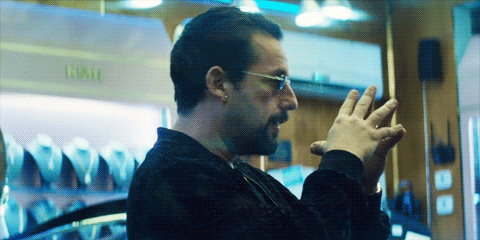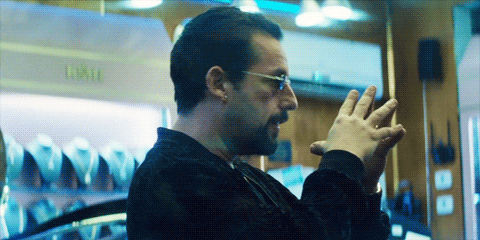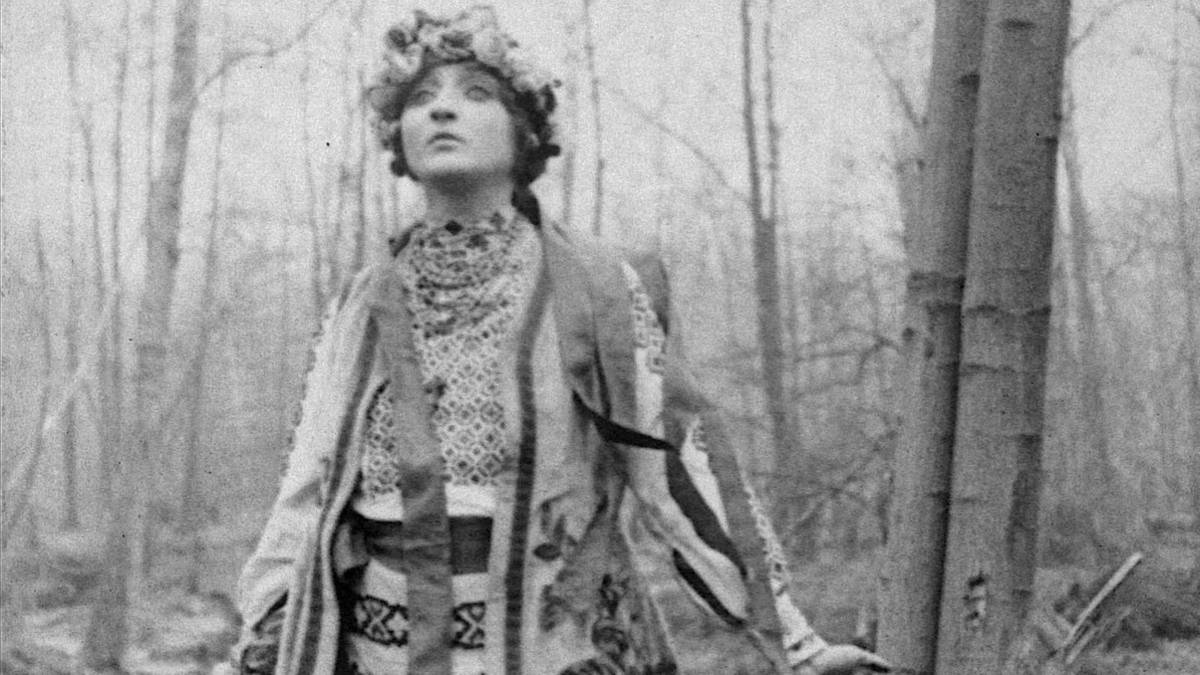The Esthers: Top 10 Jewish Films of 2020
This year, as cinemas shut down, Tablet’s critic found streaming lockdown escapist gems in clever counterhistories, rich and inventive documentaries, and rediscovered classics of Yiddish cinema. And Roy Cohn.




The Esthers return with 2020 vision along with the eternal question: What is a Jewish movie? (As I’ve said before, a Jewish movie is a movie that strikes me as being of at least potential interest to the Tablet readership.) We might also ask, what is a movie? This year you have to take them where you find them—online, on disc, and on demand.
Minute for minute, ace programmer Bruce Goldstein’s short account of the making of—and more to the point the locations used in—Jules Dassin’s 1948 policier was the most purely enjoyable movie of the year. Dassin was a native New York and The Naked City, shot all around town during the sweltering summer of 1947 (as Uncovering was during the COVID-19 summer of 2020) is, per Goldstein’s suggestively slurred adjective, the “most New York-ish movie ever made.” Not only Dassin but the producer, former Broadway columnist Mark Hellinger, and co-screenwriter Albert Maltz, were New York Jews. The movie’s title came from the book by the Galitzianer tabloid photographer Weegee and the on-set shutterbug was another, younger New York Jew, Stanley Kubrick. The Naked City included a considerable amount of Lower East Side local color as does Goldstein’s distillation. Indeed, he succeeds in magnifying Celia Adler’s cameo role, channeling Molly Picon as the sprightly proprietress of a candy store on the corner of Rivington and Norfolk, into a featured role—her biggest screen part since she starred in the 1937 Yiddish weepie Vu Iz Mayn Kind. Goldstein’s movie inspired me to take another look at Dassin’s and, forgive me for saying, Dassin’s bang-bang closer, a chase across the Williamsburg Bridge aside, I like Goldstein’s movie a lot more. You can find it on the Criterion Channel.
Thomas Heise’s historical memoir-cum-three-generational family history is a scrupulous 218-minute collection of documents, diaries, letters, and landscapes excavated and assembled by a filmmaker whose grandfather helped found the German Communist Party and whose father was the leading dissident philosopher in the old GDR.
The first part of the film, focusing mainly on the aftermath of World War I and the war that followed, concerns the courtship, marriage, and persecution of Heise’s paternal grandparents, a communist schoolteacher and a Viennese Jew; it ends with a near half-hour sequence in which alphabetical deportation lists of Viennese Jews scroll on screen as the filmmaker reads increasingly anxious letters sent to his grandmother in Berlin from her family in Vienna. When we finally see their names and the screen goes dark. In a small but real way, the sequence reproduces the dread experienced by Jews waiting to see their names appear on the list for these East-bound transports, organized, as viewers of Claude Lanzmann’s The Last of the Unjust may remember, by his subject Benjamin Murmelstein. Heimat Is a Space in Time has been released on DVD by Icarus Films; it also streams from iTunes, Vimeo, and Ovid.
This clever, maddening Cassavetes-style, très New Yorkish crime thriller by the Brothers Safdie opened for Christmas last year. I saw it some weeks later in a movie theater—and, as I haven’t been back to the movies since, it remains an indelible big-screen memory. Following up on a strong turn as Ben Stiller’s manic brother and Dustin Hoffman’s feckless son in Noah Baumbach’s underrated Meyerowitz Stories, Adam Sandler gives a career performance as a wildly unlikable and compulsively watchable hustling 47th Street diamond merchant and uncontrollable gambler. Aside from featuring one of the most appalling Seders in movie history, Uncut Gems is a great sports movie, making astounding use of an actual basketball game to underscore its climax. On Netflix and Amazon Prime.
Indulge me with a flashback 70 years to the Crime of the Century spy trial. Defendants Julius and Ethel Rosenberg were Jews as was codefendant Morton Sobell. So were prosecution witnesses David and Ruth Greenglass, Max Elitcher, and Harry Gold. Naturally the defense attorneys were Jewish but the prosecuting attorneys, Irving Saypol and Roy Cohn, were also Jews, also the judge. In fact, the only place in the courtroom where you couldn’t find a Jew was in the jury box. The jury foreman would remember feeling good that the trial was “a strictly Jewish show.” Made by the Rosenbergs’ granddaughter Ivy Meeropol, this film was one of two Roy Cohn docs reviewed here last spring and, stocked with testimony from Cohn’s relatives, is also a Jewish show with the quality of an extended, lethal family quarrel. On demand from HBO Max.
Russian writer-director Kantemir Balagov’s first feature, released here last winter in the wake of his wondrous Beanpole, an account of two shellshocked nurses tending to even more damaged soldiers in Leningrad 1945, is another brilliantly acted tale of human devastation in a devastated land, namely the Kabardino-Balkarian Republic in the North Caucasus. Closeness is set during the 1990s in Balagov’s hometown and based on an incident from his childhood. Shortly after celebrating their engagement, a young Jewish couple is kidnapped and held for ransom by Chechen nationalists, splintering both their beleaguered community and individual families and throwing the boy’s rebellious sister (remarkably played by a Moscow actor, Darya Zhovner) into an emotional maelstrom that is overwhelming to watch. On disc from Kino Lorber, streams from MUBI.
Adapted from Philip Roth’s counterhistorical novel by two veterans of The Wire, David Simon and Ed Burns, this six-part miniseries is not strictly speaking a movie. Still arriving as it did during the first COVID-19 lockdown it was something better—good TV that with its final two episodes, dealing with Jewish deportation and the emergency election of 1942, became great and powerfully relevant TV. On demand from HBO Max.
All tales of Hollywood’s golden age have a Jewish component. This one, directed by David Fincher from his father’s screenplay, filled with period detail and inside baseball in recounting the rapscallion writer Herman Mankiewicz’s contribution to the making of Citizen Kane, has a Jewish angle that could even have been stronger. A man who used to have the Marx Brothers at his Seder, Mankiewicz was both a premature anti-fascist and a perverse anti-anti-fascist. Having the actress who plays his wife call him “meshuggeneh” doesn’t quite do it. Netflix.
Seth Rogen goes aboriginal in this magic realist fable about a truculent immigrant Jew (bearded Rogen) pickled in brine for a century who wakes up in hipster Brooklyn and schools his timorous descendant (oykh Rogen, cleanshaven). Although the satire is more sweet than sour, this representation of generational conflict—a standard trope in Yiddish stage and cinema—offers much to unpack. On demand from HBO Max.

Another one from the pickle barrel, this first adaptation of Sholom Aleichem’s Tevye cycle was released in late April 1919 then disappeared for nearly a century before the family of the producer made it available to the National Center for Jewish Film who premiered their restoration at the 2020 New York Jewish Film Festival. Directed by Charles Davenport for New York-based Zion Films, using a Russian village built in Leonia, New Jersey, Khavah dramatized the core beliefs of the popular Yiddish theater—modern youngsters cause suffering when they disregard their tradition-minded elders. The suggested sell line was “Love of Parents Triumphs Over Love for Husband in Jewish Story.” By contrast to the ghetto melodramas that preceded and followed it, Khavah was among the very few American movies to represent intermarriage as a failure. It also provided a virtual road map for the Maurice Schwartz theatrical adaptation and 1939 film Tevye.
Another restoration, this 1924 Austrian feature is weirdly prophetic in dramatizing a financial crisis that results in the expulsion of all Jews from a not so imaginary Middle European country called “Utopia.” Jews leave (some for France, others for Zion). The economy sputters, courts and hospitals collapse, fashion falters, and cultural life grinds to a halt. Chastened, Utopia’s chancellor begs the Jews to return. Although the novel on which The City Without Jews was published in the United States in 1926, the state of New York refused to license the film version for distribution two years later—its satire was apparently regarded as anti-Semitic. Available on disc from Flicker Alley.
Working mainly from European prints, Lobster Films and Kino Classics have produced a set of 10 newly restored Yiddish features. The includes the two best-known Yiddish films, Tevye and The Dybbuk (for which, full disclosure, I supplied audio commentary), another blockbuster, Overture to Glory, starring Moyshe Oysher as a cantor who crosses over to the gentile side, and Edgar G. Ulmer’s Yiddish swan song American Matchmaker with the Yiddish Fred Astaire, Leo Fuch. There are also four lesser (as well as lesser-known) melodramas by Joseph Seiden, the master of bargain-basement shund and turgid mishegas, and a filmed version of The Yiddish King Lear, as it was staged for the WPA’s Federal Theater Project. The secret gem is Mir Kumen On (known in English as Children Must Laugh), a staged documentary of life in the Jewish Labor Bund’s Medem Sanitarium, directed by Aleksander Ford, who a decade later would head the Polish film industry.
J. Hoberman was the longtime Village Voice film critic. He is the author, co-author, or editor of 12 books, including Bridge of Light: Yiddish Film Between Two Worlds and, with Jeffrey Shandler, Entertaining America: Jews, Movies, and Broadcasting.